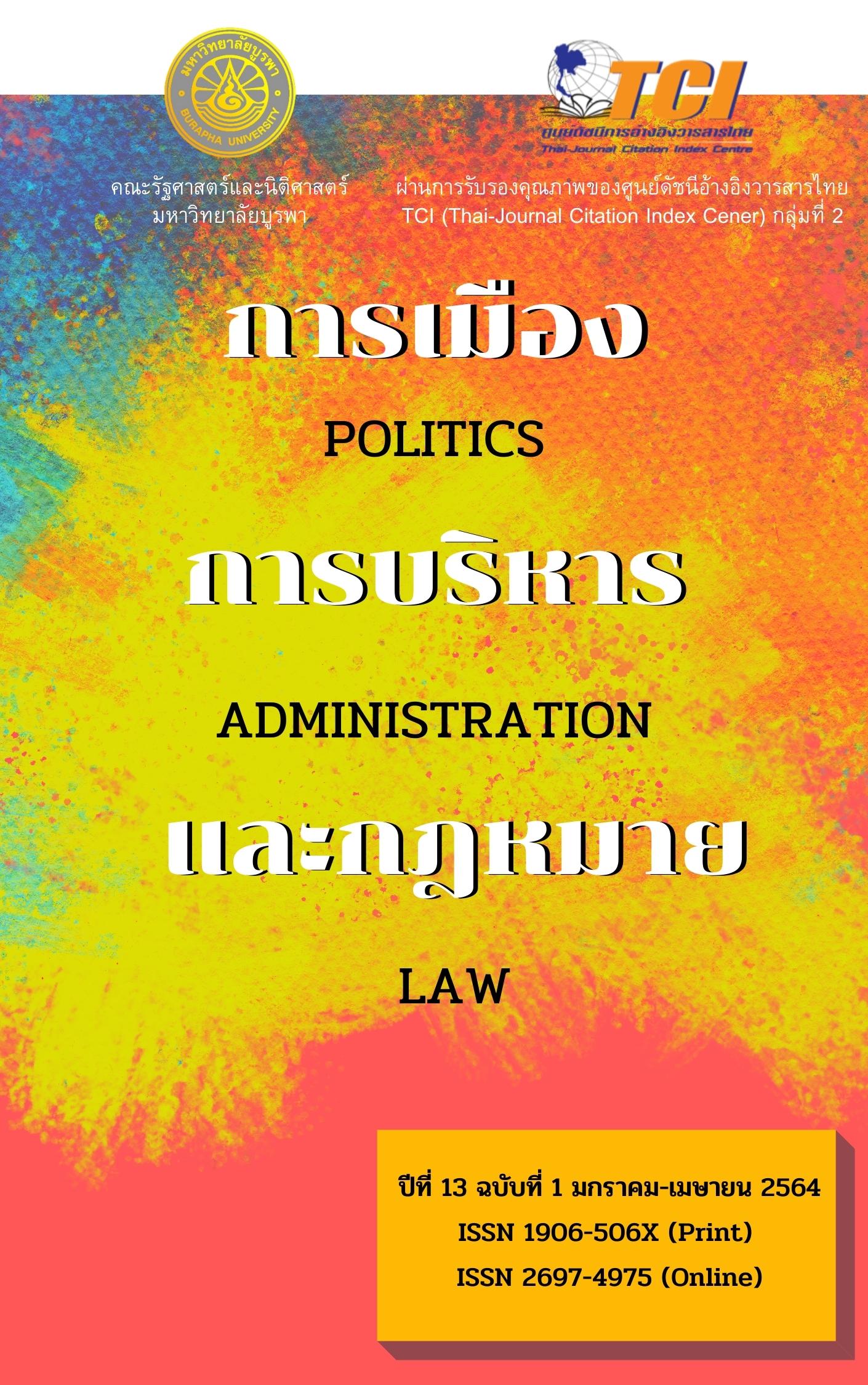นโยบายว่าด้วยอำนาจอธิปไตยถาวรเหนือทรัพยากรธรรมชาติ กรณี ความสัมพันธ์เชิงอุปถัมภ์ในการจัดการทรัพยากรปิโตรเลียมของประเทศไทย
คำสำคัญ:
อำนาจอธิปไตยถาวรเหนือทรัพยากรธรรมชาติ, ความมั่นคงทางพลังงาน, ความสัมพันธ์เชิงอุปถัมภ์, การขัดกันซึ่งผลประโยชน์ หรือ การขัดกันซึ่งบทบาทหน้าที่, ทุนนิยมแบบเล่นพวก, คณะกรรมการบริษัทบทคัดย่อ
งานวิจัยนี้มีวัตถุประสงค์เพื่อศึกษานโยบายสาธารณะในการจัดการทรัพยากรปิโตรเลียมของประเทศไทย โดยทำการศึกษาเปรียบเทียบระหว่าง ระบบสัมปทาน (Concession System) ที่ใช้อยู่ในประเทศไทย และระบบสัญญา (Contractual System) ที่ใช้อยู่ในกลุ่มประเทศอาเซียน จากการวิจัยพบว่า การให้สัมปทานปิโตรเลียมแก่เอกชนทำให้รัฐถูกจำกัดอำนาจอธิปไตยเหนือทรัพยากรของตนเอง นโยบายปิโตรเลียมของไทยในช่วงที่ผ่านมามุ่งสนองผลประโยชน์ของบริษัทเอกชนและกลุ่มผู้มีส่วนได้ส่วนเสียในกระบวนการกำหนดนโยบายฯ มากกว่าเพื่อสนองประโยชน์ของประเทศด้านความมั่นคงทางพลังงานและสังคมส่วนรวม เพราะทรัพยากรเมื่อถูกนำขึ้นจากใต้แผ่นดิน ก็กลายเป็นสิทธิผูกขาดของเอกชนเพื่อทำกำไรสูงที่สุดให้แก่ผู้ถือหุ้น ขณะที่กลุ่มประเทศอาเซียนได้เปลี่ยนไปใช้ระบบสัญญา โดยรัฐบาลจะยังคงเป็นเจ้าของกรรมสิทธิ์ในทรัพยากรโดยสมบูรณ์ จึงนำมาซึ่งความมั่นคงทางพลังงานในมิติความมั่นคงดั้งเดิม และในมิติความมั่นคงใหม่ ที่ให้ความสำคัญกับของสวัสดิการ และความผาสุกของมนุษย์ อย่างไรก็ตาม แม้ระบบสัมปทานจะมีข้อด้อยต่อประเทศไทยมากกว่าระบบการจัดการแบบอื่นๆ แต่ระบบสัมปทานก็ยังสามารถดำรงอยู่ได้อย่างมีเสถียรภาพมาจนถึงทุกวันนี้ ทั้งนี้เพราะกลุ่มผู้ที่มีอำนาจหน้าที่ในการกำหนดนโยบายปิโตรเลียมของไทยเป็นกลุ่มผู้นำทางการเมือง การทหาร ข้าราชการชั้นสูง และนักวิชาการ เพียงไม่กี่ร้อยคนที่ได้รับส่วนแบ่งผลประโยชน์จำนวนมหาศาลจากการได้รับแต่งตั้งเป็นกรรมการบริษัทในธุรกิจปิโตรเลียม กลุ่มผู้มีอำนาจกำหนดนโยบายฯ เหล่านี้จึงมีท่าที่เป็นมิตร (Allies) หรือเห็นดีเห็นงามกับระบบสัมปทาน มากกว่าที่คัดค้านระบบสัมปทาน คำสำคัญ: อำนาจอธิปไตยถาวรเหนือทรัพยากรธรรมชาติ, ความมั่นคงทางพลังงาน, ความสัมพันธ์เชิงอุปถัมภ์, การขัดกันซึ่งผลประโยชน์ หรือ การขัดกันซึ่งบทบาทหน้าที่, ทุนนิยมแบบเล่นพวก, คณะกรรมการบริษัท
เอกสารอ้างอิง
กระทรวงพลังงาน กรมเชื้อเพลิงธรรมชาติ. (2559). รายงานประจำปี 2558. วันที่ค้นข้อมูล 14 ธันวาคม 2562, เข้าถึงได้จาก https://dmf.go.th/public/list_upload/backend/list_5786/files_8434_1.pdf
ติน ปรัชญพฤทธิ์. (2521). วิจารณ์และแนะนำหนังสือ Theodore J. Lowi, Benjamin Ginsberg et al.
Polisclde (New York: Macmillan Publishing Co., 1976). วารสารพัฒนบริหารศาสตร์, 18(4), 718 -721.
รังสรรค์ ธนะพรพันธ์. (2546). กระบวนการกำหนดนโยบายเศรษฐกิจในประเทศไทย บทวิเคราะห์เชิงประวัติศาสตร์เศรษฐกิจการเมือง พ.ศ. 2475-2530. กรุงเทพฯ: คบไฟ.
วีระศักดิ์ พึ่งรัศมี. (2554). แนวทางการบริหารจัดการแหล่งสัมปทานปิโตรเลียม หลังสิ้นสุดสัมปทาน. กรุงเทพฯ: วิทยาลัยป้องกันราชอาณาจักร.
สถาพร เริงธรรม. (2549). วาทกรรมทางนโยบายกับการคอร์รัปชัน ศึกษากรณี การทุจริตในการจัดซื้อยาและเวชภัณฑ์ของกระทรวงสาธารณสุข พ.ศ. 2541 (Doctoral dissertation). กรุงเทพฯ: มหาวิทยาลัยธรรมศาสตร์.
สมบัติ พฤฒิพงศภัค. (2540). การนำระบบแบ่งปันผลผลิต (Production Sharing) มาใช้ในการให้สิทธิสำรวจและผลผลิตปิโตรเลียมในประเทศไทย (Master’s Degree). กรุงเทพฯ: จุฬาลงกรณ์มหาวิทยาลัย.
Blau, P. M. (1964). Exchange and Power in Social Life. New York: Wiley.
Clapham, C. (Ed.). (1982). Clientelism and the State. In Private Patronage and Public Power: Political Clientelism in the Modern State (pp.7-8). London: Frances Pinter.
Dahl, R. A. (1961). Who Governs?: Democracy and Power in an American City. New Haven: Yale University Press.
Forbes. (2019). The World’s Largest Public Companies. Retrieved June 21, 2020, from https://www.forbes.com/global2000/list/#search:equi
Miliband, R. (1969). The State in Capitalist Society. London: Quartet Books.
Organization of the Petroleum Exporting Countries. (2016). OPEC Annual Statistical Bulletin 2016.
Vienna, Austria. Retrieved June 25, 2020, from https://www.opec.org/opec_web/static_files_project/media/downloads/publications/ASB2016.pdf
Raphael, S., & Stokes, D. (2013). US oil strategy in the Caspian Basin: Hegemony through interdependence. International Relations, 28(2), 183-206.
Scott, J. C. (1972). Patron-Client Politics and Political Change in Southeast Asia. The American Political Science Review, 66(1), 91-113.
Stares, P. B. (2000). Introduction and Overview, Rethinking Energy Security in East Asia. Tokyo: Japan Center for International Exchange.
Chotipanvittayakul, S., & Mantajit, J. (2011). Comparison of Petroleum Arrangement: Concession,
Production Sharing Contract and Service Contract. Paper Presented at 4th Petroleum Forum: Approaching to the 21st Petroleum Concession Bidding Round, Chatuchak, Bangkok, 26-27 May 2011.
Wamsley, L. G., & Mayer, Z. N. (1973). The Political Economy of Public Organizations. Bloomington and London: Indiana University Press.
Mackenzie, W. (2009). South East Asia Upstream Service Country Overview. The World Factbook,
Central Intelligence Agency. Retrieved June 21, 2020, from https://www.cia.gov/library/ publications/the-world-factbook/fields/269rank.html
ดาวน์โหลด
เผยแพร่แล้ว
ฉบับ
ประเภทบทความ
สัญญาอนุญาต

อนุญาตภายใต้เงื่อนไข Creative Commons Attribution-NonCommercial-NoDerivatives 4.0 International License.






